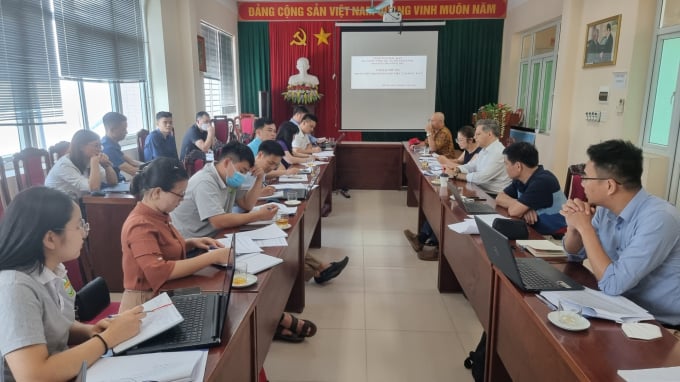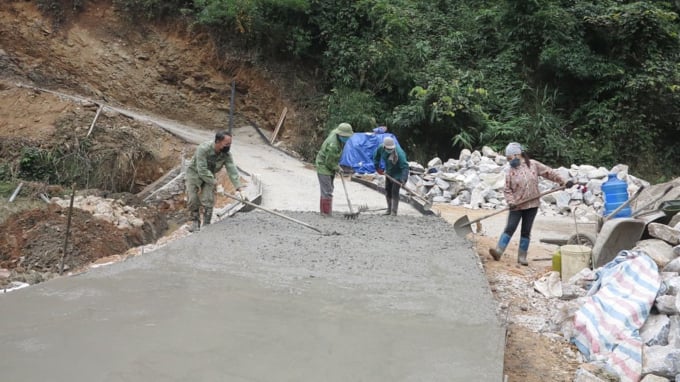November 24, 2025 | 19:43 GMT +7
November 24, 2025 | 19:43 GMT +7
Hotline: 0913.378.918
November 24, 2025 | 19:43 GMT +7
Hotline: 0913.378.918
CSSP focuses the contribution to the advancement of sustainable poverty reduction in Bac Kan province, aiming to increase the income and minimize the susceptibility of poor and near-poor families in the project's target communes to climate change.
Mr. Hoang Van Giap, Deputy Director of Bac Kan's Department of Planning and Investment and Director of the IFAD-supported CSSP Coordination Board of Bac Kan province, stated that the project went into effect on August 7, 2016, but due to slow and limited allocation of ODA loan, the project was only able to complete the activities to prepare for investment between 2017 and the second quarter of 2019. From 2020 until the present, when ODA was completely provided, the project has accelerated execution and distributed direct investments to the community and the people.

The IFAD mission in Vietnam worked with the Bac Kan Province CSSP Project Coordination Board. Photo: TN.
Despite a brief period of implementation on Bac Kan, the CSSP project has achieved a number of significant outcomes thanks to the efforts of IFAD officials and leaders in Vietnam, as well as the efforts of its executors.
It is amply demonstrated by the following statistics: Support for forestry land certification with an area of 17,075ha (plan is 17,000ha) and 11,177 certificates; established and approved funding for 490 cooperative groups from the "Competitive Small Grants" (CSG); invest in 214 community infrastructure works; established and disbursed loans for 135 new Credit Savings groups with 1,879 members; approved and signed sponsorship contracts for 7 businesses and cooperatives from the Agribusiness Promotion Investment Fund (APIF).
Notably, the adoption of five Strategic Investment Plans (SIP) at the provincial level has allowed the province of Bac Kan to construct and develop a commodities industrial chain that includes turmeric, galangal, ginger, bananas, and black pigs. Strategic investment plans for value chain development are executed, leading to an increase in incomes, the creation of employment, the improvement of people's lives, and the elimination of hunger and the reduction of poverty. Assisting families in transitioning from producing items linked with the value chain from the provision of high-quality seeds and seedlings, transferring technical faculties, and supporting product consumption. Thus establishing a partnership and connection between the product's manufacturer and customer.
In addition, the initiative created 15 Value Chain Action Plans (VCAPs) for agricultural output at the district and commune levels, based on the relative strength of each locale. Ba Be district is involved in a green and fragrant gourd, raising free-range chickens, bananas, and fattening buffaloes; Na Ri district is involved in a chain of chicken, turmeric, seedless persimmon, and black pig; Ngan Son district is involved in a chain of sticky rice with nua green rice, fattened cattle, chestnuts, and sweet potatoes; and Pac Nam district is involved in fattening buffaloes, black pigs, and ginger.

The CSSP project in Bac Kan province has invested in 214 community infrastructure works. Photo: TN.
Ms. Do Thi Minh Hoa, Vice Chairwoman of the Bac Kan Provincial People's Committee and Head of the CSSP Project Steering Committee in Bac Kan province, said that Bac Kan is an impoverished, mountainous region with very challenging economic circumstances and little investment resources. As a result, the infrastructure is still inadequate, and individuals are sluggish to change their production mindsets, thus businesses remain scattered and tiny.
Together with the Government's plans and policies, the CSSP project is being executed with the objective of integrating and synthesizing resources for the socio-economic development of Bac Kan province. The project has made a significant contribution and is one of the determining elements for the effective execution of the aim of poverty reduction and development of people's living standards; it actively supports the achievement of the new rural construction program's objectives. Ms. Hoa was quite appreciative of the IFAD monitoring team in Vietnam's methodical, optimistic, and highly objective approach to work.
The Commercial Small-holder Support Project in Bac Kan Province is a project financed by a loan from The International Fund for Agricultural Development (IFAD) for the two provinces of Bac Kan and Cao Bang with a total budget of USD 42.5 million (USD 21.25 million for each province). There is also a reciprocal budget between the Vietnamese Government, the localities, and the beneficiaries of the program.
Translated by Linh Linh

(VAN) Dong Thap promotes agricultural restructuring, forms large specialized farming zones, raises the value of agricultural products and develops toward ecological and high-tech directions.
/2025/11/22/4018-4-213342_747.jpg)
(VAN) The Mekong Delta Agricultural Experts Club has attracted 143 experts and researchers to participate in providing consultancy and contributing initiatives to the development of one million hectares of high-quality rice.

(VAN) Ca Mau’s development of OCOP products opens a path to increasing cooperatives value, helping boost income, expand markets, and affirm collective economy's role.

(VAN) Turning seemingly ordinary coconut shells into unique jewelry and artwork, Nguyen Bang Nhi spreads the value of local culture through her brand, Cocohand.

(VAN) Results from the Sustainable Durian Model Project in Dak Lak have confirmed the critical role of Yara Viet Nam in transferring advanced nutritional solutions to farmers.

(VAN) In Tuyen Quang province, livestock farmers have introduced effective models and innovative practices that significantly strengthen African Swine Fever prevention and control efforts.

(VAN) This is the study conducted by IRRI and Can Tho University on the rice straw value chain in Mekong Delta showing an economic potential of more than 6.6 trillion VND/year.